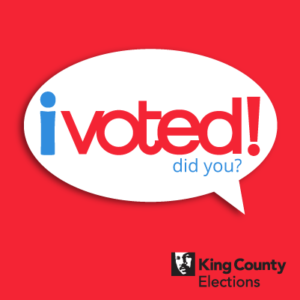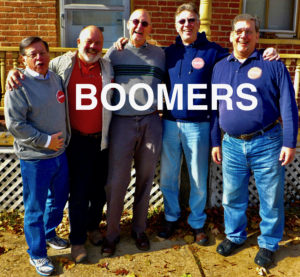Tuesday, November 3, 2020 is Election Day in the United States. So was Tuesday, November 8, 2016. In the last general election about 58% of eligible voters actually voted.
Will you be one of the people who votes this year?
I certainly hope so, not only because it is your right, but rather, because it is your duty.
Government By the People
Most of you reading this, myself included, were granted the right to vote when we were born. We had to wait 18 (or 21 if you are older) years before we could execute that right, but basically we did nothing more – this was one of the many gifts we received merely by being lucky to have been born in the USA. For my non-American readers born in democracies, you too were very lucky.
According to Freedom House, about 40% of the world’s population lives in countries considered to be “Free,” where there is an elective government with citizens having a legitimate right and opportunity to vote. I’m sure that there are other creditable sources which differ in their quantification, but there can be little doubt that several billions of persons world-wide do not have this basic human right. Among the most notable without this basic right to choose their political leaders are the Chinese, North Koreans, Russians, Cubans, and Saudis.
Without this basic right, unless someone is born into an exceedingly wealthy family or accumulates great wealth by some means, they have virtually no say in what their government does.
I consider myself lucky to have been born in the US. I also feel that I have an obligation to contribute to maintaining the democratic freedoms given to me. At the very least I should vote.
Excuses for Not Voting
“Does it really matter, I am such a minority in my district that the “other” side always wins?”
“Aren’t all politicians pretty much the same?”
“What if none of the choices on the ballot really does it for me?”
“I don’t want to vote for someone who does not support (Fill in the blank for your favorite single issue cause________).”
I have heard all of these statements four years ago, mostly from discouraged Bernie supporters who basically said, “The hell with it.” after Hillary squeezed Bernie out of the race. A snide version of me might ask, “How did that work out for you?” A more civil version of me would parrot the overused, but accurate, cliché, “Elections have consequences.”
We need to vote, not just to get people into office who do exactly what we want them to do, but even more importantly, to preserve the system that allows us to have any say in government in the first place.
Why Vote When the Other Side Always Wins?
If you live in Seattle (Washington 7thCongressional District) like I do and want to vote Republican for Congress you are not going to have your candidate win. Conversely, if you live in the Idaho First District, where my cousin lives, and you want to vote for a Democrat, you will not likely be voting for a winner.
Even if you think it is not possible for your favorite candidate to win, I submit that it is still important that you vote. Vote, not because you think the winner will support your positions exactly, she or he likely will not. Rather, you need to voluntarily vote to maintain the power of the vote, which, in turn, helps us retain a democracy.
Candidates who want to be reelected must at least consider the needs of those who oppose them if the numbers are high enough. The smaller the number of people who vote against them, the more they will shift to meet the needs of only those who did vote for them. This could be to the right or to the left depending on the district. The result of course, is even more polarization, less compromise, and more opportunity for special interests. Special interests who may or may not represent the needs of the population at large.
It is wise to remember that in the course of maybe 5,000 years since the Sumerians started recording history, the radical idea that “the people” should rule is only 242 years old. The idea that “all people” should vote, even women, is only about a hundred years old.
Worldwide the idea that people should choose their leaders, although it has caught on recently, is still far from universal and current trends seem to indicate it is at risk and possibly even on the wane.
If people do not exercise their right to vote, there also is much more likelihood of us foregoing democracy altogether with one side or the other going for a “strong man” who gets things done the way they want them done – human rights notwithstanding.
What if There Are No Candidates Who Take My Positions on the Issues?
This argument, like it’s cousin, “All politicians are the same,” is a threat to democracy. Like the Rolling Stones said, “You can’t always get what you want,…”
The idea of democracy (which I define as the people being actively involved in governing) was never that all people would like all of the decisions of government. Compromise is inherent in the system.
If you don’t accept that compromise is necessary, then you must also be willing to accept an autocracy. Wise and well-meaning people see things differently. Sometimes we have to accept what we believe is a less than perfect solution.
Sometimes you just have to choose between the lessor of two evils. Wait patiently, your day will come. The pendulum always swings in a democracy.
What about Voter Registration?
Perhaps the most important aspect of voting is determining who gets to vote.
There has been much written/said lately about the fact that many groups within our citizenry are not registered to vote and therefore cannot exercise their rights.
There have been efforts in several states to increase the requirements to register to vote and to “purge” voter registration lists of names of people who have not voted recently or who appear not to be eligible. The net result of such efforts is likely that fewer people will actually vote. Some would argue that this is necessary to ensure that people who vote are fully qualified to do so. Others see this as a means of suppressing votes among groups less likely to vote the way they want.
My view is that there is truth in both arguments, but both sides miss the larger issue: we should be working to increase voter turnout, not decrease it. At the same time we need to insure that only qualified persons actually cast ballots.
The fewer people who participate in the electoral process, the weaker our democracy becomes.
The National Voter Registration Act of 1993 requires that states allow eligible citizens to register to vote when completing other transactions at state motor vehicle and social services agencies. Oregon took this one step further and automatically registers everyone applying for an ID or drivers license while giving them the ability to opt out.
The Russians, Chinese, and Other Bad Guys
While the report on the 2016 Election by Special Council Robert Mueller did not directly implicate the President, it unequivacably showed that the Russians did interfer in our election.
(Side note: Mueller was a Marine contemporary of mine who also served as a lieutenant in the Second Battalion, Fourth Marines (AKA The Magnificent Bastards) during the same time frame that I was in Vietnam, although I did not know him personally.)
The Russians were able to access and create a false narrative and increase divisiveness by using our social media, which, by the way, is where the majority of Americans now get their news (See my previous post titled “Truth” if you are interested in my opinion of this trend). Like it or not, Facebook, Youtube, Twitter and their counterparts do influence voters and there are foreign forces (Read Autocrats) who have a vested interest in influencing our elections and in increasing divisiveness between Americans.
All indications are that the Russians, and very likely others, will continue to try and disrupt our democracy again in 2020. The idea of “the people ruling” is not a comfortable concept for an autocrat. It is clearly to the advantage of dictators internally if the Democracies in the world are seen to be in a state of political disarray.
Even more importantly than their influence on social media, the Russians, more accurately GRU agents at the direction of Putin’s government, tried to access our vote counting systems, most of which rely heavily on electronic data capture and storage. Apparently they were unsuccessful in this effort in 2016.
However, it is not a question of “if” but rather “when” our electronic systems will be compromised. If our electronic voting systems are hacked, how will we know whether a “winner” really “won”?
Why Your Vote Counts
At the time of the 2016 election there were approximately 250,056,000 persons of voting age in the U.S who could have been eligible to vote. 138,847,000 of these people actually voted with 62,984,828 (46.1%) of them voting for the winner, Donald J. Trump.
Another way to look at this is that Trump won the election by having a little less than 27% of eligible voters voting for him. Looked at still another way, the 323,400,000 Americans had their president selected by about 19% of the population. Kids don’t vote of course, but they are definitely influenced by the results of the election.
Lest you think this is an anti-Trump message, consider this: President Obama, who got 65,915,796 (51.1% of the total) votes in 2012 with a smaller eligible population of 235,248,000 still won with only 28% of the eligible vote or about 21% of the total population of 314,000,000 in 2012.
My point here is not that Obama got more votes and a higher percentage of registered voters than Trump, but more importantly, that our presidents are chosen by a relatively small percentage of the population.
Analysis by the Pew Research Center found that 35% of non-voters cited work or school commitments, which prevented them from voting, 34% said they were too busy, unwell, away from home or forgot to vote, 20% either didn’t like the choices, didn’t know enough or didn’t care and 10% had recently moved, missed a registration deadline or didn’t have transportation.
Some might argue that if some people don’t bother to vote it is probably better that they did not because they are not informed/enlightened anyway. I challenge that position.
Some conservatives, knowing that their older, wealthier base is more likely to vote the way they want them to, might be tempted to try to restrict voting and make it harder for poorer and younger voters to register and/or actually get to the polls. However, any short-term gain this strategy might yield would be offset long-term by a loss of faith in the democratic system.
Conversely, some on the left might consider placing virtually no controls or checks on the voting process, basically allowing anyone who shows up to vote. They might do this figuring that most of those who would vote this way are more likely to support liberal candidates. Again, this strategy is shortsighted. More might vote, but the legitimacy of the process could easily be called into question, degrading the value and legitimacy of the vote itself.
If the percentage of persons actually voting continues in a downward spiral, we will leave ourselves open to an autocratic takeover. If we don’t bother to vote, why should politicians or the bureaocrats they select worry about our welfare? There are special interest groups that will serve up enough dark money to provide the façade of a free election.
I don’t Like Any of the Candidates
Voting for third-party candidates or writing in a protest vote is not OK. Like it or not, we have a two-party system in the U.S. and if you waste your vote, then others will decide for you. Don’t let 27% make this critical decision for you.
What can we do to protect our right to vote, increase voter participation, and ensure the legitimacy of the process?
Here are my recommendations for changes to our National voting system:
- Adopt the Oregon “opt out” registration system. If you want an ID card/Drivers License or you want to apply for government benefits, you are automatically registered to vote. If you have religious or other qualms about registering, you can elect not to be registered by opting out.
- Go to paper mail-in ballots like Washington, Oregon, and Colorado now have. This mail-in system provides a number of benefits including: a. Allowing voters to take some time to think (ballots are mailed weeks before the election day) with their ballot and really make sound decisions. Voters can check with trusted information sources and read/use the voters guide when filling out their ballots. b. Paper ballots are “real” – in a close race they can be recounted. They cannot easily be changed or destroyed – at least not by someone on a PC from virtually anywhere in the world. c. There is a voting period giving maximum flexibility for persons whose work and/or caregiving or other obligations make voting during a single 12-hour time block very difficult. d. Paper mail-in ballots eliminate the very long wait times at polling booths – some people have to work and take care of their kids.
- Go one step further than Oregon did: If you don’t vote in say 2 years (or at the very least just mail in an empty ballot, essentially voting “none of the above”), you can’t get a renewal of the ID card, nor can you get food stamps or other government benefits. Why should you get services and benefits from the government if you are not willing to do your absolute minimum civic duty and at the very least, register to vote? There could be waivers on this requirement, but I feel that people should be responsible for voting, especially if they can vote via mail-in ballots.
- Invest in the very best signature identifcation systems. The technology now exists to electronically determine whether the signature on the ballot is in fact the same as the one on file with the state in which you are registered. I know this works personally because I have really bad penmanship. Last election my ballot was “held” until I was able to document that I was in fact Jim Simpson. This was incovenient, but I felt good to know that the system works. It was my sloppy penmanship that caused my ballot to be held so I had no one else to blame. I was notified by text, phone, and by mail to provide documentation within a window of time that was short, but I felt adequate.
- Continue to offer local polling place options. In King Couny we have 47 Ballot Drop Boxes where people can safely deposit their ballot on the day of the election. This option is good for people who procrastinate and for those who do not want to enter their ballot into the USPS system. Washington State also offers Vote Centers for voters who need assistance. These are only on a limited basis (I think there is at least one per County not one per precinct) and there are some instances where I can see an advantage to actually going to a local/neighborhood polling place. An example might be a person who felt intimidated by their spouse or another person living with them. The privacy of the polling booth would allow these individuals to vote without fear or interference by others who might be present when they were filling out their paper ballots. There are also disabled people who require assistance to complete their ballots and this would best be provided by an election official, not a friend or family member. Again, this adds cost, but hey, democracy is not the cheaper system.
In summary:
I have stated some reasons why high voter turnout is important to a democracy and I have identified some systemic changes that could/should be made to increase voter participation, ensure that only qualified persons vote, and protect the vote count from electronic hacking.
You, however, don’t have to wait until these changes are in place.
In the meantime, just VOTE!







